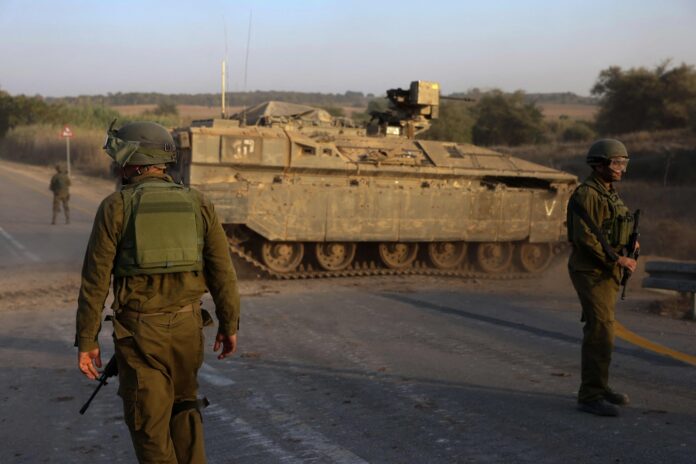Yet despite a speedy mobilization that saw hundreds of thousands of Israel reservists join their units and remarks that the mighty Israel Defense Forces are “ready,” no ground offensive has begun. As my colleague Steve Hendrix reports from Israel, there are growing questions about this apparent delay. “Both those who yearn for the ground war to begin and those who dread it are looking for clues,” he writes.
Israeli ground troops unilaterally withdrew from the Gaza Strip in 2005 and imposed a land, air and sea blockade two years later after Hamas took power. They have temporarily returned twice since then:during Operation Cast Lead in 2008-2009 and during Operation Protective Edge in 2014.
Israel has suggested that this time will be a far larger operation, given the gravity of the violence committed by Hamas, with the aim to not only to degrade Hamas, but to permanently defeat it. But while Israel is devastating Gaza with airstrikes — resulting in 6,500 deaths, according to the Gaza Health Ministry — and it has made at least one limited incursion, this ground offensive has not yet begun.
“I also won’t detail the range of considerations, most of which the public is not aware of,” Netanyahu said in an address to the nation Wednesday, 18 days after the attack on Israel. “And that’s the way it is supposed to be. This is the way so that we protect our soldiers’ lives.”
This time is notably different from limited incursions in the past. A ground operation represents a far more difficult terrain for Israel to navigate, both in Gaza itself and in the wider region. Big picture, there are serious questions not only about whether a ground offensive could backfire in unexpected ways, but also whether it could ever hope to achieve its aims.
Hamas seems to have anticipated a ground offensive before its assault Oct. 7. It took some 200 people hostage as it rampaged through Israel. One hostage released this week said how her captors had seemed prepared to hold people, with clean rooms and mattresses on the ground in rooms deep inside a network of underground tunnels.
In the past, Israel has gone to major lengths to protect the safety of hostages and return them home. In 2011, the government reached an agreement with Hamas to return Israeli soldier Gilad Shalit in exchange for 1,027 prisoners, including some who are now in Hamas’s leadership.
The tunnels are potent defensive advantages in the type of urban warfare we are likely to see in any Israeli ground offensive into Gaza, providing the advantage of surprise. Israel has attempted to destroy these underground networks before and has come up with new technology that it hopes can combat them, but most signs suggest that Hamas has only doubled down on the tactic, with the presence of hostages making the most destructive Israeli methods hard to stomach.
Just as hard to digest is the inevitable presence of Palestinian civilians in the combat area. Despite Israeli officials suggesting that the “gloves are off” and hitting the Strip with an unprecedented number of airstrikes, their orders for civilians to move from the north of Gaza and the quick reaction to claims they struck a hospital suggest they are at least somewhat sensitive to concerns about noncombatants caught in the crossfire.
Even supportive countries like the United States have qualms about the number of civilian deaths already seen in Gaza, and there are growing calls for a humanitarian cease-fire to allow aid into the strip. Public opinion is already against Israel in the region, even in countries where Netanyahu’s government had just weeks ago been seeking diplomatic openings.
Meanwhile, Iran and its proxies present a far more potent threat to the country than they have in the past. A wider regional conflict could stretch both Israel and its allies: The White House has drawn up plans for mass evacuations from the region, while the Wall Street Journal reported Wednesday that the United States had pushed for a delay to any ground offensive so that it has time to place air defenses in the region to protect U.S. troops.
Israeli military planners are unlikely to be under any illusions about any of this. They know of all these problems and perhaps more, which is why there has been deliberation about the ground offensive within Israel leadership. “Thank God there are disagreements,” Yaakov Amidror, a former general and Netanyahu’s national security adviser from 2011 to 2013 said to be still consulting with the prime minister, told The Washington Post. “They should argue for hours, for days and nights.”
The biggest argument, of course, is whether Israel can actually achieve its goals in Gaza through a land invasion. Writing in the Financial Times, John Sawers, the former chief of British spy agency MI6, argued that “Israel’s security chiefs know the goal of destroying Hamas is probably beyond their reach” and that even if it were, the question of what comes after it is equally dangerous and requires planning now.
Israel has waited for years, even decades, to exact retribution. The most recent killing linked to Operation Wrath of God, the name given to the covert plot to kill the Palestinian militants who planned or aided the 1972 attack on Israeli athletes at the Munich Olympic Games, was in 1992. It took 20 years after the end of World War II for Herberts Cukurs, a Nazi collaborator dubbed the “Butcher of Latvia,” to be shot dead in Uruguay by Israeli agents.
Can Israel afford to wait this time? Given the public anguish in Israel itself, it may not be politically tenable. But there is much at stake, both in the short term and the long term. As Haaretz’s Amos Harel wrote Wednesday: “A failed offensive in Gaza could be one blow too much for Israeli morale.”



